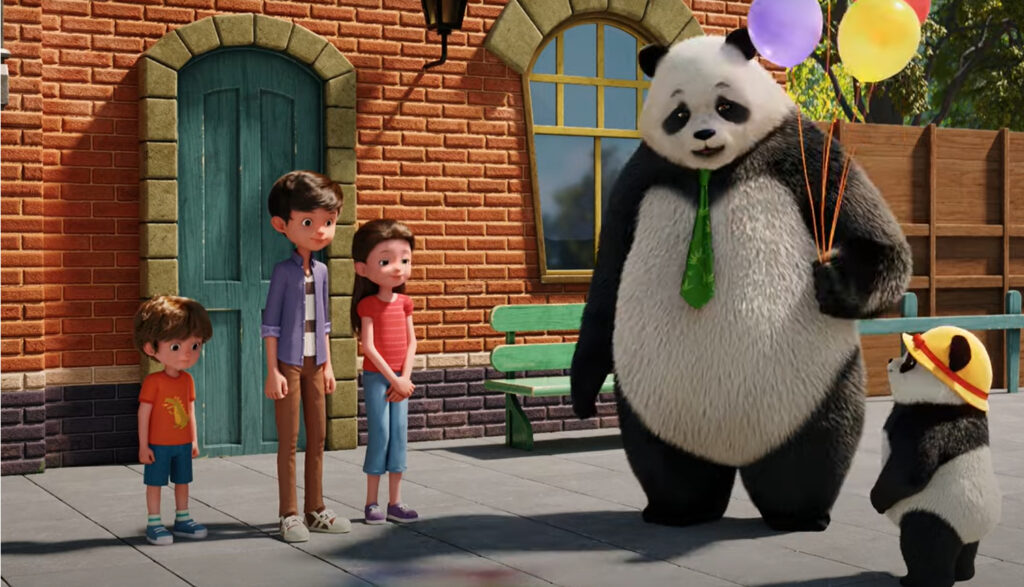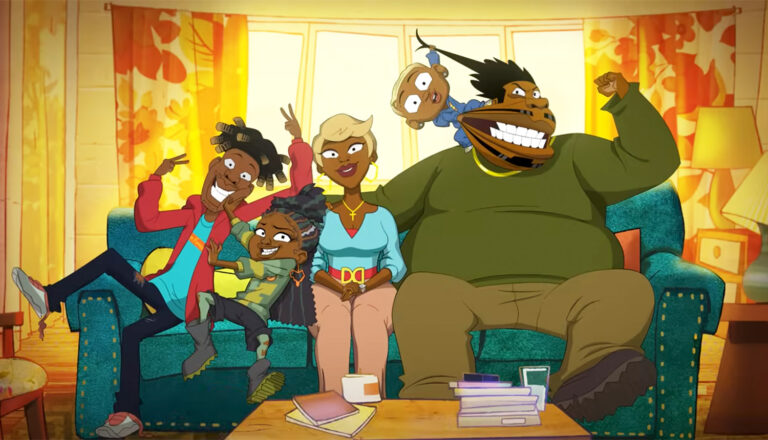
Frieren: Beyond Journey’s End
An elf mage contemplates on connection and regret as she watches her human friends grow old and pass away.

Pandas are not known for their adaptability. But at least one of the critters is doing just fine in American suburbia.
His name is Stillwater, and he lives right next door to three spirited children named Michael, Addy and Carl. Shy? Not this panda.
True, he still sports some very panda-like traits: He loves to eat his bamboo, of course, and he’s turned his property into something of a Far Eastern paradise: Zen gardens, koi ponds and even bonsai-like trees make his address look half a world away from the children’s more typical backyard. And in a sense, perhaps it is.
When the children visit Stillwater (which is, as you might expect, quite often), the panda often sits them down and tells them stories: parables and fables and plain ol’ folk tales, often from his far away home. When they worry or fight, he gently turns their minds toward more productive ways of thinking—nudging them along, like a river-bound root might tap a floating leaf in a different direction. Rarely does he “teach” his neighbors anything: Rather, he helps them teach themselves.
Sounds rather Zen, doesn’t it? And that’s just how good ol’ Stillwater wants it.
Apple TV+’s Stillwater is based on a series of children’s picture books by Jon J. Muth, the first and most popular o which was called Zen Shorts. But honestly, the show most powerfully reminded me of another franchise entirely: Focus on the Family’s own Adventures in Odyssey.
If you’re not familiar with Odyssey, it features a genial, grandfatherly gentleman named John Avery Whittacker (aka Whit) who, through his homespun ways, offers solid biblical grounding and a little dash of imagination, helps give the children and adults of the town of Odyssey some grand moral and spiritual guidance—often without it feeling like a “lesson” at all.
Stillwater may be a little hairier than Whit, but he has that same gentle, wise charm about him—feeling as old and wise as an oak tree, but still somehow young enough to enjoy a good climb now and then. But instead of peppering his young pupils with Christian wisdom and Bible verses, Stillwater pulls his parables from Zen Buddhism, Taoism and other Eastern religions and philosophies.
That may sound dispiriting and perhaps even alarming to many would-be Christian viewers, who might have seen the show’s beautiful artwork and now lament that Stillwater just might be off limits for their families because of its explicitly non-Christian worldview. I get that.
But while the show certainly draws from those Eastern traditions (and could potentially spark the curious to explore those traditions more earnestly), neither Stillwater (the panda) nor the stories seek to indoctrinate. We don’t hear any explicit references to religion or mysticism at all (though you may hear a reference to yoga on occasion). Those just tuning in wouldn’t see Buddhism or Taoism (unless they squint really, really hard); they’d see a panda who likes to tell stories with some good, universal lessons: Sharing is important. Rain can be good. Be nice to others. They feel like the fables of Aesop—written in a far different culture but with timeless lessons we can learn from in the here and now.
And the artwork—which floats between the more traditional CGI animation of Stillwater’s world to the more storybook art of his tales—is absolutely gorgeous. Taking a virtual walk through Stillwater’s garden can feel a little like a vacation in itself.
Certainly Stillwater has its issues, and if I had to choose between the panda and Whit I’d choose Odyssey’s favorite shopkeeper any day. But this Panda offers some nice lessons, too—along with a healthy serving of bamboo.
Karl learns about patience. Then Addy figures out the importance of not overcommitting.
A child pouts for a bit but soon learns to use his imagination to pass the time instead of complaining. A traveler accidentally drops several items after agreeing to carry too much. A girl retroactively tells her friends she can’t help them, but they’re understanding and apologize for asking too much of her.
In the episode’s first segment, Carl tries to build a spaceship, but he’s discouraged when his older brother says it’ll never get off the ground. In the second segment, Michael pouts because the rain spoiled his baseball game. But when he sees Stillwater sitting in the rain, he ventures out into the wetness to see what’s up.
Stillwater tells him that he enjoys the rain—imagining how far those raindrops must’ve traveled to land on his fur. And he tells Michael the story of the gardener and the bee: The gardener was scared of the little insects and asked a beekeeper friend of hers to get rid of a nearby hive. But when they disappeared, so did all of her beautiful produce. It’s a bit of a science lesson and, if you want to dig, an environmental one, too. But Stillwater tells it in order to remind Michael that while rain my spoil baseball games, it’s a good thing, too. And they end the segment splashing about in mud puddles.
The story Stillwater tells Carl involves a hard-working farmer who wanted to grab hold of the sun so he could have a little more daytime to enjoy. He built a tower up to the sky—a tower for which all his neighbors laughed at him. It’s impossible to grab hold of the sun, they said. But the farmer had the last laugh: The tower allowed him to see over the trees and to see the sun on the horizon when the rest of his neighbors were in shadow. He grabbed those few extra minutes of daylight after all.
It’s possible that some parents might not appreciate the sight of children playing in mud puddles or using good duct tape to build a cardboard spaceship, but that’s about all the quibbles we can find here.


Paul Asay has been part of the Plugged In staff since 2007, watching and reviewing roughly 15 quintillion movies and television shows. He’s written for a number of other publications, too, including Time, The Washington Post and Christianity Today. The author of several books, Paul loves to find spirituality in unexpected places, including popular entertainment, and he loves all things superhero. His vices include James Bond films, Mountain Dew and terrible B-grade movies. He’s married, has two children and a neurotic dog, runs marathons on occasion and hopes to someday own his own tuxedo. Feel free to follow him on Twitter @AsayPaul.

Emily studied film and writing when she was in college. And when she isn’t being way too competitive while playing board games, she enjoys food, sleep, and geeking out with her husband indulging in their “nerdoms,” which is the collective fan cultures of everything they love, such as Star Wars, Star Trek, Stargate and Lord of the Rings.

An elf mage contemplates on connection and regret as she watches her human friends grow old and pass away.

Netflix takes a classic sitcom, Good Times, and turns it into a vulgar, violent, sexually-charged TV-MA show.

While its protagonist might live a nuanced life, The Sympathizer’s problematic content can’t be described the same way.